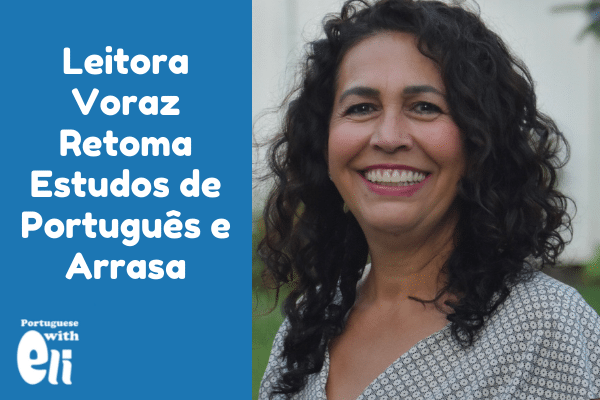Stuck at Home, Voracious Reader Decides to Take Up Portuguese Again… and Ela Está Arrasando

In 2020, the world seemed to come to a halt. Suddenly, you couldn’t go to restaurants anymore, your kids should stay home, and sometimes you even lost your job.
Even when you didn’t lose your job, you couldn’t continue working due to the nature of your work. If you had to go to places and interact with people, your job was pretty much suspended.
An Unexpected Chance to Resume a Much-Loved Hobby
And that was what happened to Yuri. She is a professional cleaner — faxineira profissional — and she had to go to places. But not being able to go anywhere, she had to stay home.
Other people might get nervous — and many did — but not Yuri. She has had a lifelong passion for languages, and she decided to double down on learning Portuguese after studying it on her own for about seven years.
Why did she decide to study Portuguese more intensively?
“I love the accent. I speak Spanish, and [I thought] I could study Portuguese much faster.”
Being originally from Mexico but having lived in Minnesota for a long time, Yuri can speak both English and Spanish to perfection. She has used this knowledge to help her.
In the interview, she mentions that the similarities between Spanish and Brazilian Portuguese help, even though sometimes they might confuse you.
“But you get the hang of it and you go on learning. In the beginning, I used to speak Portuñol a lot.”
As of this writing, Yuri has been learning Portuguese for seven years, but she has been taking classes with me for about eight months.
“I have improved my Portuguese more in eight months than in about eight years that I have been studying on my own.”
Although it does flatter me — after all, we’ve been working together — I can’t say I am the main cause of her improvement.
A Habit that is a Boon to Language Learners
Yuri is a voracious reader. Reading is her main hobby.
“I also like to read a lot and I also like bizarre stories because they are very interesting. I hate romance novels, but the different stories, as you said, are very interesting. Very appealing. I also really like books from the previous centuries. It’s very interesting.”
And it is a “conspicuous secret” so many learners miss – reading is not about reading as an assignment. It should be interesting. In Yuri’s case, she doesn’t like romance novels (and I can see why, though I indulge in reading some for escapism), but she keeps reading what sparks her interest. In this way, she can keep herself motivated to read in Portuguese the things she most likes.
Reading, by the way, has been proven to help language learners improve their vocabulary more effectively than simple exercises. And even if Yuri might not be aware of this, she’s tapping into a powerful principle there.
But it’s not only learning Portuguese, is it?
Of course, she also likes to do outdoor activities, like kayaking, cycling, and camping.
By the way: did you know that doing exercises — or being physically active — helps you retain more information? Our interviewee has the perfect routine for a language learner — good health and constant practice.
The Importance of Historical Perspective
Back to the books, Yuri mentions that reading books from past centuries helps her have a historical perspective of the present.
As a member of the Book Club, she’s read a book called A Viuvinha. In her words, “as they say, the books from the previous century… you learn a lot about the culture, about things as they were before. And [you learn] that sometimes they don’t change much, like they are now, right? But I like it very much.”
And the biggest challenge when learning Portuguese?
As a Spanish speaker, Yuri finds the vocabulary quite confusing. Due to the similarities, you never know exactly what word to use.
And I agree with her. As a student of Spanish, I have encountered so many “false friends” — words that look the same but have completely different meanings.
And sometimes the double meaning can embarrass you (like the very own word “embaraçar”!)
Now it’s your turn
Of course, we discussed so much more!
And I invite you to listen in as we discuss learning Portuguese, life, the importance of history, and things people enjoy doing.
Since Yuri’s a pretty advanced speaker, I include an unedited transcript of our conversation for your benefit. It’s not time-coded, and there might be spelling mistakes and imprecisions.
Thank you, and you’re welcome to join the conversation by leaving a comment below.
P.S. I had no better way to express Ela está arrasando. It’s something we say in Portuguese when we think someone rocks. It’s highly informal. Even though I imagine “she rocks” might do, ela está arrasando simply conveys what I needed better (in my opinion).





